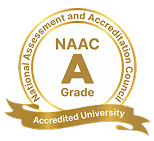Recuritment for Various Position Click here to know more

Recuritment for Various Position Click here to know more

Code of Conduct
AMENDMENT IN
GANPAT UNIVERSITY EMPLOYEES’ CODE OF CONDUCT
Regulations for Employees’ Code of Conduct
- Introduction: These regulations shall be called “The Ganpat University Employees’ Code of Conduct”, and they shall come into force with the date of issue of this notification.
- Applicability: Unless and otherwise specifically provided, these regulations shall apply to all the existing employees of the University and its constituent Colleges, Promoting Body, and Institutes run by it, and shall apply to those who shall be recruited hereafter.
- Definition: In these rules, unless the context otherwise requires “UNIVERSITY” means The Ganpat University.
“EMPLOYEE” means any employee appointed through directly or indirectly on Regular/Probation/Contractual/Ad-hoc/Temporary basis.
“APPOINTING AUTHORITY” means the authority empowered to appoint under The Ganpat University Act.
“MISCONDUCT” means as define in Regulation No. 9 under this ‘Ganpat University Employees’ Code of Conduct’.
“OATH” means as define in Regulation No. 11 under this ‘Ganpat University Employees’ Code of Conduct’.
Employees’ Code of Conduct
This Code of Conduct defines the ethical principles that reinforce professional practices. It is through these principles that University wants to act and be perceived as a responsible university in a challenging environment. They serve employees as a basis on which to provide a sustainable and trustworthy performance. The Code of Conduct is a significant pillar of the University development and encourages correct and acceptable behavior in all situations.
Following Code of Conduct safeguards the sustainable success of the University. University and its employees stand for and live by these basic principles.
- Code of Professional Ethics:
- Every employee shall, at all times, maintain absolute integrity, honesty, and impartiality in his/her profession while discharging his/her official dealings.
-
- An employee should, at all times, be courteous while dealing with other staff members, students and members of the public.
-
- Unless otherwise stated specifically in the terms of appointment, every employee is a full time employee of the University, and shall be called upon to perform such duties, as shall be assigned to him/her by the competent authority, beyond scheduled working hours, holidays & Sundays. These duties shall, inter alia, include attendance at meetings of committees to which he may be appointed by the Institute of the University or any of its authorities.
-
- An employee shall be required to observe the scheduled hours of work, during which s/he must be present at the place of his/her duty.
-
- Except for valid reasons and/or unforeseen contingencies, no employee shall be absent from duty without prior permission.
-
- Employees, being in teaching profession, are constantly under the scrutiny of their students and the society at large. Therefore, every employee should see that there is no incompatibility between his/her precepts and practices. The professional further requires that the employees should be calm, patient and communicative by temperament and amicable in disposition.
-
- Adhere to a responsible pattern of conduct and demeanour expected of them by the community.
-
- Manage their private affairs in a manner consistent with the dignity of the profession.
-
- Express the free and frank opinion by participation at professional meeting, seminars, conferences etc. towards the contribution of knowledge.
-
- Refrain from availing themselves of leave except on unavoidable grounds and as far as practicable with prior intimation, keeping in view their particular responsibility for completion of academic schedule.
-
- All employees, both teaching & non-teaching, in all favourable and unfavourable conditions, shall execute discretion while dealing with their routine and unusual duties in line with the brand and image of the University.
-
- As to avoid, to be caught unaware about the general/normal information of other constituent institutes/departments, all employees shall proactive towards the information as to be helpful in case any visitor seek their help.
-
- No employee can become a direct reporting authority of any other employee who is a family member or a close relative of the reporting authority. No employee, irrespective of the authority given, can participate in any review or other committee and cannot take or influence any decisions pertaining to the financial matters or promotion related matters of the other employee who is his or her family member or a close relative.
- Code of Respect towards students
- Respect the right and dignity of students in expressing his/her opinion.
-
- Deal justly and impartially with students regardless of their religion, cast, political, economic, social and physical characteristics.
-
- Recognize the difference in aptitude and capabilities among students and strive to meet their individual needs.
-
- Be affectionate to the students and not behave in a vindicate manner towards any of them for any reason.
-
- Make themselves available to the students even beyond their class hours and help and guide students without any remuneration or reward.
-
- Refrain from inciting students against other students, colleagues or administration.
- Dress Code
- All the employees should be decently dressed, befitting the impression of an academic campus. Casual dressing like Jersey, T-Shirts, Jeans, Slippers, etc. is not allowable. The ideal dressing for a male employee is half/full sleeve formal shirt with light colours, dark/light colour formal trousers and leather shoes. The ideal dressing for a female employee is formal and light coloured full/half sleeve salvar kameez/sari giving decent appearance and decent chappals/sandals.
- Confidentiality
Any kind of person-related data, University and operating secrets (whether University related or those of third parties), financial data and information that is of sensitive nature shall be considered as confidential information.
-
- No employee shall, publish/disclose/ broadcast any information pertaining to the University anonymously, or in his/her name, may be in press or otherwise through public utterance, which will invite adverse criticism of the University.
-
- No employee shall, except in accordance with any general or special order of the competent authority, or in the performance, in good faith, of the duties assigned to him/her communicate, directly or indirectly, any official document or information to any person to whom s/he is not authorized to communicate such document or information. Even in case of authorized person, s/he shall communicate through appropriate channel only.
-
- Communicate promptly to the immediate authority and consult, if any one seeks such information as well as for any significant concern, or complaint rather than directly taking action on their own.
-
- No employee shall directly, or by other means, approach higher authority of his/her immediate reporting officer/supervisor, in any case without consulting; hereafter all the special orders, authorities, powers or such other permissions in this line shall be overruled and s/he shall abide his/her communication through appropriate channel only.
-
- No employee shall directly, or by other means, approach higher authority of his/her immediate reporting officer/supervisor, in any case without consulting; hereafter all the special orders, authority, power or such other permission shall be overruled and s/he shall abide his/her communication through appropriate channel only.
-
- Employee prepares carefully and stores university/department/institute documents as required by the legal regulations of the University or any regulatory body and in accordance with the customary university practices. This applies in particular how and how long the documents are stored.
-
- The honour and preserve the sanctity of the confidential matter in tangible and intangible form having of intellectual property right related issues (logo, brands, vision and mission and the like).
-
- Give the University high priority, even when faced with time constraints, and to realistically acknowledge that a s/he must sacrifice to promote University goals
-
- Accept responsibility as per the policy guidance of the University and adheres and act strictly in accordance to it.
-
- Act always for the benefit of the University as a whole and never for the benefit of special interests.
-
- Aid in shielding the University from outside/inside pressures that, if yielded to, would be damaging the image and work culture.
-
- Refrain from any form of action or involvement that might prove detrimental or embarrassing to the University, and to resign if such a situation should develop.
-
- Work continually for the advancement of higher education.
- Assignment outside of the University
- No employee shall take part in any political activities of any kind, without prior approval of the Director.
-
- No employee of the University shall, engage, directly or indirectly, in any trade or business or any private tuition or undertake any employment outside his/her official assignments.
- Criminal Proceeding / Recourse to Court of Law
- An employee who gets involved in any criminal proceedings shall immediately inform the competent authority through the Head of the Institution/College, irrespective of the fact whether he/she has been released on bail or not. An employee who is detained in police custody, whether on criminal charges or otherwise, for a period longer than forty-eight hours shall be deemed as suspended, and not join his/her duties in the University or its constituent Colleges/Institutes, unless he/she has obtained written permission to that effect from the Director.
-
- No employee shall, except with the previous sanction of the competent authority, have recourse to any Court of Law or to the Press for the vindication of any official act, which has been the subject matter of adverse criticism or an attack of defamatory character. Provided nothing in this rule shall be deemed to prohibit an employee from vindicating his/her private character or any act done by his/her personal capacity.
- Grievance Redressal
- Whenever an employee wishes to put forth any claim, or seeks redress of any grievance or of any wrong done, he/she must forward his/her case through proper channel, and shall not forward advance copies of the application to any higher authority, unless the immediate authority has rejected/refused to hear the grievance.
-
- No employee shall be signatory to any joint representation addressed to the authorities for redress of any grievance or of any other matter.
- Gender Sensitivity
- No employee shall indulge in any act of sexual harassment of any kind, which includes unwelcome sexually determined behaviour as described by the IPC(whether directly or indirectly) such as:
- Physical contact and advances;
- Demand or request for sexual favour;
- Sexually coloured remarks;
- Showing and watching pornography;
- Any other unwelcome physical, verbal or non-verbal conduct of sexual nature.
- No employee shall indulge in any act of sexual harassment of any kind, which includes unwelcome sexually determined behaviour as described by the IPC(whether directly or indirectly) such as:
- Misconduct
Misconduct means if a University employee does any of the following things:
-
- Willfully disobeys, or willfully omits, for bears or neglects, to execute any lawful orders or instruction or commits a breach of any of the provision of the rules of conduct;
-
- Commits any wilful breach of the trust and duty of his office;
-
- Demands, accepts, or receives, by himself or another, in the discharge of his duties, any gift, reward or remuneration except in accordance with such rules as may be prescribed by the University;
-
- Indulges in any un-lawful activity or in political preaching amongst the students or the employees of the University;
-
- If he does any such thing as under mines or is likely to undermine the prestige of the University, or is detrimental or likely to be detrimental to the interests of the University or disturbs or is likely to disturb the harmony and cohesion of the corporate life of the University;
-
- Gross partiality in assessment of students, deliberately over-marking/under- marking or attempts favouritism at victimization on any ground;
-
- Inciting students against other students, colleagues or administration (This does not interfere with the right of a teacher to express his difference on principles in seminars or other places where students are present);
-
- Indulging in communal activities, or raising questions of caste, creed, religion, race or sex in his relationship with his colleagues and trying to use the above considerations for improvement of his prospects;
-
- Absence without leave, overstay after expiry of leave, leaving the Institution without permission from the Head of Institution during working hours, by the teachers and non-teaching staff;
-
- Theft of University property or the property of the other employees, teaching and non-teaching, and students and any other person within campus;
-
- Damaging the property of the University / Institutions, both moveable and/or immoveable;
-
- Any act which deteriorate the overall atmosphere of the campus or the institute;
-
- Involving in any kind of violence in and outside the campus including instigating the violence;
-
- Involvement in criminal act like using alcoholic beverages, drugs, gambling on or outside the campus including instigating the other students for such action;
-
- Participating, sharing or instigating inappropriate information on any platform of communication, including e-medium, amounting shame to the University’s prestige and image;
-
- Any action by an employee that shall directly influence or cause detriment to the University employment of any other employee who is his/her closed or distant relative.
-
- Any other act which the Head of the Institution feels as gross misconduct, which are not covered under the above category;
- Promoting and Protecting Whistleblower
- All employees shall show utmost integrity and honesty while exchanging information, to whomsoever within formal proper communication channel, as to pass on actual and undiluted information against any individual or group of individuals, that in the interest of the University, parental body and its Constituent Colleges/institutes.
-
- It is a violation of University policy to retaliate against an individual because she or he has made, in good faith, a disclosure of noncompliance or has participated in an investigation, proceeding or hearing involving noncompliance of any regulation of any act of Ganpat University/ AICTE/UGC/ State Government.
-
- The University, herewith, assure all employees that it shall provide all kinds of supports and protections, whenever an employee or group of employees, stand for the truth and within the compliance of any regulation of any act of the Ganpat University/AICTE/UGC/State Government.
- Oath
All the existing employees shall swear in and undertake the following oath to keep their conduct in line with the Code of Conduct under this Regulation,
“I, being the well-wisher of the Ganpat University, swear in this oath, in the presence of the Board of Governors, that I by my act and deed will always adhere to the Code of Conduct, at all times, without any prejudice, as per the Code of Conduct Regulations of the University. In case of breach of Code of Conduct, knowingly or unknowingly, the decision of the authority is binding me.”
Swearing in of above oath shall be binding to all employees of the University, falling which s/he shall have to suffer the appropriate penalties.
- Penalty
- Any one or more of the following penalties shall for good and sufficient reasons, such
as misconduct, moral turpitudes neglect of duty, violation of any term or condition or service inefficiency, indiscipline criminal conviction, be imposed upon any employee of the University.
-
- Minor Penalties:
- Censure
- Fine
- Withholding of one or more (not exceeding three) annual increments.
- Recovery from his pay of the whole or part of any pecuniary loss caused to the University by negligence or breach of order.
-
- Major Penalties:
- Reduction to a lower stage in the time scale of pay for a specified period.
- Reduction to a lower time scale of pay, grade post or service.
- Compulsory retirement.
- Removal from service which shall not be a disqualification for future employment under university.
- Dismissal from service, which shall ordinarily be a disqualification for future employment under the University.
Note 1.—Penalties should be proportionate to the gravity of misconduct.
Note 2.—Penalties inflicted, excepting censure, with clearance from the Board of Governors shall be recorded in the Service Book of a teacher or non-teaching staff held guilty of misconduct.
-
- Explanation:
Unless imposed as a penalty the following shall not ordinarily amount to a penalty within meaning of this regulation.
- Non-promotion whether in a substantive or officiating capacity of a University employee to a service, grade or post for promotion, to which he is in ordinary course eligible, on administrative grounds and not a measure of penalty on the ground of his misconduct.
- Reversion to a lower service, grade or post of a University employee officiating in higher service grade or post on the ground that he is considered, after trial, to be unsuitable for such higher service, grade, or post or on purely administrative grounds.
- Reversion to his permanent service, grade or post of a University employee appointed on probation to another service, grade or post during or at the end of the period of probation in accordance with the terms of his appointment or the rules and orders of University in this behalf for the time being in force.
- TERMINATION OF SERVICE –
- Of a University employee appointed on probation; or
- Of a University employee employed under a contract in accordance with the terms of such contract; or
-
- Of a University employee due to unauthorized absence from duty for a period of thirty days.
-
- Disciplinary Procedure in Minor Penalties
1. In case of minor penalty, the nature of allegation shall be communicated to the employee concerned and he will be given a minimum period of 1 week from the date of the receipt of the communication by him to submit his explanations, if any. Upon receipt of his explanation or on the expiry of the period of 1 week given for submission of explanation, the authority concerned shall after necessary examination of relevant facts and circumstances either drop the case or decide to impose upon the employee concerned any one or more of the minor penalties.
-
- Disciplinary procedure in Major Penalties
1. In case of a major penalties, the grounds on which it is proposed to take action shall be reduced to the form of a definite charge or charges and communicated to the employee concerned together with a statement of the allegations on which each charge is based and of any other circumstances which it is proposed to take into consideration in passing orders on the case. The employee charged shall be required to put in a written statement of his defence within ten days from the date of receipt of the communication by him along with documentary evidence, if any. Upon receipt of the statement of defence, or on the expiry period not exceeding ten days or as may be extended, the authority concerned shall, after examination of relevant facts and circumstances, either drop the case or decide to proceed further. If it is decided to proceed further, a formal enquiry shall be held and asking him to be present at the enquiry, if he so desires, and to produce further evidence, if any, in support of his defence. The authority concerned shall thereafter take decision on the findings of enquiry. If it is decided to impose penalty, another opportunity will be given to him to submit show cause as to why the particular penalty decided to be imposed by the appointing authority within a week’s time. On receipt of the communication in this respect in response to the show cause notice or on expiry of the period of one week or granted period of extension a final decision will be taken by the appointing authority to impose penalty and communicate the same to the employee.
Note: No pleader shall be allowed to appear at the enquiry on behalf of the University or the person charged.
-
- Disciplinary procedure, whether minor or major penalties, Shall be not applied
- Where the authority empowered to dismiss or remove or make him to retire prematurely is satisfied that for reasons to be recorded in writing, it is not reasonably practicable to give the person an opportunity of showing cause against the action proposed to be taken in regard to him; or
- Where the security of the Nation, State or University is involved.
Note: If any question arises, whether it is reasonably practicable to give to any person an opportunity of showing cause under the disciplinary procedures against the particular penalty proposed to be inflicted, the decision of the President shall be final. Vide Clause no. 32, Ganpat University Act.
- So far as the provisions covered if any specific provision is not covered under the document, then the same will be applicable on the lines of similar rules made applicable to the employees of State Government, will mutatis mutandis be applicable to the University and its Constituent Colleges, Promoting Body and Institutes run by it, subject to the approval of the BoG.
- Notwithstanding anything contained in these Regulations for Employees’ Code of Conduct, the Board of Governors may relax any of the conditions mentioned in these Regulations, but in exceptional cases.







